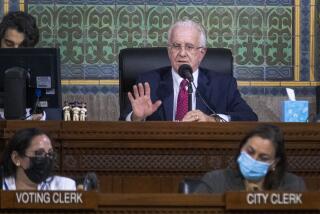Katz Rejects Alarcon Apology for Mailer
Nearly a month after winning a divisive state Senate race in the San Fernando Valley, City Councilman Richard Alarcon apologized Monday to former Assemblyman Richard Katz for a campaign mailer that falsely linked Katz to the intimidation of Latino voters.
But Katz, who was so enraged by the mailer that he has refused to speak to Alarcon, rejected the apology, saying it is “neither genuine nor sincere.”
The exchange between the two Democratic candidates and former allies demonstrates the depth of the hostility that remains from the Valley’s hottest primary contest.
As of late last week, Alarcon had denied responsibility for the mailer, saying it was drafted by his campaign consultant and paid for by the chairman of the state Latino Caucus, state Sen. Richard Polanco (D-Los Angeles).
But on Monday, Alarcon wrote to Katz, saying he wanted to make amends and put the negative attacks of the campaign behind him.
“I am writing to offer my formal apology for the mailer that could be perceived as linking you negatively with the Orange County poll guard incident in 1988,” Alarcon wrote, referring to an incident in which Republican candidates were accused of hiring guards to scare Latino immigrants away from the polls.
The mailer, which Polanco sent to 18,000 newly registered Latino voters, ignited racial tension in the 20th state Senate primary race, which Alarcon won by 29 votes to claim the Democratic nomination.
Polanco, who has defended the mailer, calling it “well within the line of acceptable practices,” could not be reached for comment.
The mailer was sent only four days before the June 2 primary, giving Katz little time to respond. After the polls closed, Katz called the mailer “race baiting.” And Democratic Party leaders, the Anti-Defamation League and the Jewish Federation of Greater Los Angeles called the literature “racially divisive” and inflammatory.
Even Alarcon’s own campaign consultant, Richard Ross, conceded in an interview with The Times that the mailer gave the false impression that Katz was involved in the Orange County incident. In fact, Katz was one of the loudest critics of the Republican candidates involved in the incident.
Last week, Ross offered to apologize to Katz for the mailer. “I can see how a reasonable person could see I tried to associate Katz with the poll guards,” Ross said. Ross said he had used the Orange County incident in other campaigns as a way to encourage Latinos to vote.
In 1988, Republicans posted uniformed guards at 20 polling places in predominantly Latino areas of Santa Ana, and the guards carried signs in English and Spanish warning that noncitizens could not vote. Curt Pringle, the Republican candidate in what was then the 72nd Assembly District, narrowly defeated Democrat Christian (Rick) Thierbach to win the seat. The Republican Party paid $400,000 to settle a suit brought by Democrats over the incident.
The 20th state Senate District stretches from the city of San Fernando to Van Nuys to Reseda. Since 1990, Latino voter registration in the district has jumped from 16% to 24%.
It was only last week that Alarcon said he would not apologize for the mailer unless Katz apologizes for his own negative campaign pieces, in particular the mailer that publicly disclosed his Social Security number.
“For me to apologize for that piece, which I didn’t condone and I didn’t authorize, without an apology from him is fruitless,” Alarcon had said.
But Alarcon’s campaign manager, Annette Castro, said Alarcon decided to try to make peace with Katz after reflecting on the dispute over the weekend.
Still, in the same letter in which Alarcon extended a hand of friendship to Katz, he continued to attack some of Katz’ campaign materials.
“I was deeply offended and disappointed by several of the pieces your campaign sent to voters during the course of this campaign,” Alarcon wrote. He said he was most upset by a campaign piece that suggested Alarcon and his wife, Corina, failed to pay their income taxes.
“I am not requesting an apology, although I think one would be appropriate, especially to Corina,” Alarcon stated in the letter.
In a press release issued Monday, Katz refused to accept Alarcon’s apology because, Katz asserted, Alarcon has yet to “condemn the contents of the [mailer] nor has he called to task those individuals responsible for it.”
Katz also said “Alarcon never acknowledged what the mailer was intended to do and accomplish.”
“Given all of this, Mr. Alarcon’s letter is neither genuine nor sincere and I cannot settle for anything less than an unconditional apology,” Katz wrote.
More to Read
Get the L.A. Times Politics newsletter
Deeply reported insights into legislation, politics and policy from Sacramento, Washington and beyond. In your inbox three times per week.
You may occasionally receive promotional content from the Los Angeles Times.











